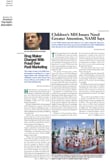The National Alliance for the Mentally Ill (NAMI) issued a report last month analyzing issues related to the use of psychotropic medications for children and adolescents. Noting the current controversies, especially surrounding the use of antidepressants in youth, NAMI made four major recommendations on improving access to high-quality mental health care for America's youth.
The report, written by Darcy Gruttadaro, J.D., director of NAMI's Child and Adolescent Action Center, and Joel Miller, M.S.Ed., acting director of NAMI's Policy Research Institute, summarizes the work of a NAMI Policy Research Institute task force meeting in 2003. The report is intended to provide important perspectives on the need for sound clinical practice and giving parents information with which to make decisions in the best interest of their children.
Noting that 1 in 10 children has a mental illness severe enough to cause functional impairment and the surgeon general's warning that 80 percent of these children never get the treatment they need, the report begins by setting out the context in which the issues must be explored. The task force sought to balance the fact that “psychiatric medications can be lifesaving for many children, but require careful weighing of risks and benefits, close monitoring, and frequent evaluation.”
While the U.S. Food and Drug Administration is re-evaluating the safety and efficacy of numerous medications in pediatric populations, a number of state and local initiatives over the last few years have restricted communication between schools and parents about the early warning signs of mental illness in children. These issues have led to an even wider treatment gap, the task force believes.
The report details four major recommendations aimed at guiding policy, legislation, and research.
First, NAMI calls on the National Institute of Mental Health to make research on early-onset mental illnesses and the use of psychotropic medications in children a priority and to increase research funding accordingly.
In addition, research must be translated into practice, the report said.“ For children and adolescents, there is little correlation between what treatments are known to work and what is actually implemented in the mental health care system,” the report noted.
The second recommendation is that it is crucial to remember that “one size does not fit all when it comes to treating mental illness.” The report calls for wide and open access to evidence-based assessment tools and interventions as the foundation of quality care. This evidence-based system, the task force noted, should “require clinicians to continually improve care by using the most current evidence and research to make decisions about the most appropriate medication and treatment, on an individual basis.”
Third, the report strongly recommended that all “families, child-serving professionals, and other stakeholders” must receive information and education about how to diagnose and treat child-onset forms of mental illness effectively. Particularly important, the report emphasized, information about the early warning signs of these illnesses and the appropriate use of psychotropic medications to treat them must be included.
The report further stressed that “psychotropic medications for young children should be used only when anticipated benefits outweigh risks” and called for close monitoring and frequent evaluation of children taking psychotropic medications.
Finally, the report called on policymakers to not interfere with the“ right of access to treatment, the patient-provider relationship, or the promotion of partnerships for treatment between parents, providers, and other child-serving professionals.” Action on any legislative or regulatory consideration regarding psychotropic medication use in children and adolescents must be “guided by science” and “occur only after testimony from qualified and well-recognized medical and mental health professionals.”
Throughout the report, the task force indirectly acknowledged the severe shortage of child and adolescent psychiatrists by noting, “It is crucial that primary care providers and child-serving agencies receive appropriate training to recognize the early warning signs of mental disorders and apply screening and early recognition tools—such as normed questionnaires that function like the blood pressure cuff of mental health care.”
The full text of the report is posted online at<www.nami.org/kidsmeds>.▪
